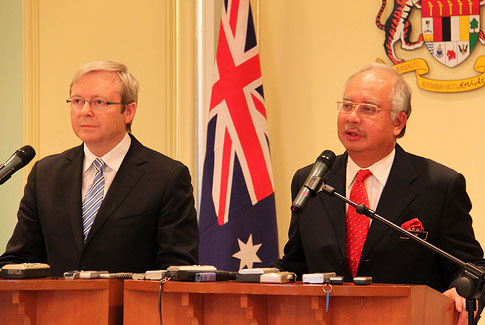Rudd also understands that raising human rights issues in Malaysia does not go down well. The fact that 1,535 people (citizens and non-citizens) have died in the custody of the Malaysian government (jails, rehabilitation centres and detention centres for illegal immigrants) from the lack of care and/or outright abuse between 2003 and 2007 did not stop Rudd from praising the way Malaysia handled its illegal immigrants.
Despite Prime Minister Rudd’s best efforts, the outcomes from the meeting only addressed a limited number of issues – reiterating and strengthening ongoing security cooperation in attempting to curb human trafficking, promoting trade, green technology and education. No mention was made of the Asia Pacific Community.
It is unlikely that Malaysia will support the Asia Pacific Community on the principle of neutrality and non-interference, but also because it is not a certain player.
Malaysia’s foreign policy is guided fundamentally by one of ‘neutrality’ – avoiding imperialism and big power alignment while ensuring regional stability and meeting domestic political expectations. A classic example of Malaysia’s ‘neutrality’ was the ability to choose its alignment selectively based on needs. Hence, the defence pact with Australia, Britain and New Zealand which was crucial to the newly independent Malaysia but declining to become a member of the U.S. influenced South East Asia Treaty Organisation (SEATO), and instead opting for the Non-Aligned Movement (NAM) to demonstrated Malaysia’s neutrality while it remained a faithful member of the Commonwealth.
Regional stability is exemplified by the formation of the Association of Southeast Asian Nations (ASEAN), its principle of non-interference and keeping big powers and its allies out of the region while domestic political expectations are best explained by anti-colonialist and pro Malay/Islamist rhetoric such as support for the Palestinian cause, Bosnia-Herzegovina, membership in the Organisation of Islamic Countries (OIC).
Malaysia cherished non-interference as it witnessed countries in the region become prey to the big powers during the Cold War. By remaining neutral but with significant assistance from the U.S., British, Australia and New Zealand, Malaysia managed to focus on developing the local economy. It therefore prefers to handle political and security issues through bilateral channels. Disputes within ASEAN still today are addressed bilaterally and not through formal regional groupings. This explains why ASEAN or the ASEAN Regional Forums remains the way they are – weak – and why APC is a long way off.
Although Malaysian and Australian security cooperation goes back to the time Malaysia was a British colony, it has weakened over time as threats such as communism and from hostile neighbours dissipated. Relations since the 1970s have been stormy. There have been some improvements since 9/11 as Malaysia became the focal point of measures to address terrorist activities in the region.
A significant improvement in cooperation was achieved when Australia signed the Treaty of Amity and Cooperation (TAC) in December 2005 and has observer status at ASEAN meetings. This reversed the Howard government’s policy stance that the TAC conflicts with Australia’s security arrangements with the U.S. and New Zealand and more worryingly then, Australia’s right to pre-emptive strikes. This stance proved to Malaysia that it needed always to be wary of any country that has a tendency to intervene. Australia’s record in the Pacific and East Timor was relevant baggage.
Malaysia’s current understanding of ‘neutrality’ is now driven by the need to remain competitive in an increasingly integrated global economy and to address modern day threats such as terrorism and piracy. Malaysia post-Mahathir and especially after the 2008 general elections, is a very different country. Mahathir’s contempt for western democracies is not present in the new administration while the ruling party’s dismal performance in the general elections has forced it to rethink its economic policies especially those relating to affirmative action as Malaysian’s blame them for Malaysia’s stagnating economic performance.
All this has required that the present government accelerate its participation in the plethora of regional trade arrangements including western democracies such as the U.S. and Australia – both key trading partners. Under the Badawi and Najib administrations, political, commercial and cultural ties have continued to improve. Malaysia’s trade relationship with Australia was most recently crowned with a free trade agreement that included New Zealand. Discussion on an ASEAN + 6 (ASEAN, China, Japan, South Korea, India, Australia and New Zealand) agreement continues.
Whether or not the Asia Pacific Community idea takes off in the near future, Australia-Malaysia relations seem set to improve.
Gregore Lopez is currently pursuing a PhD in Economics at Australian National University and blogs at malaysiasdilemma.wordpress.com. He also volunteers as the Editor of the Malaysia section of New Mandala.

